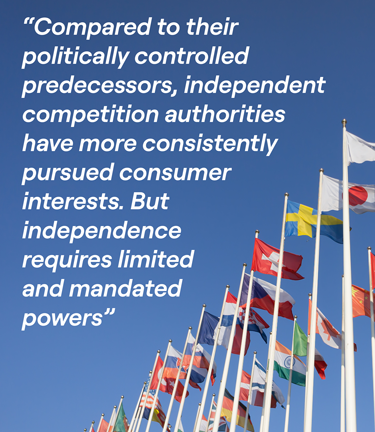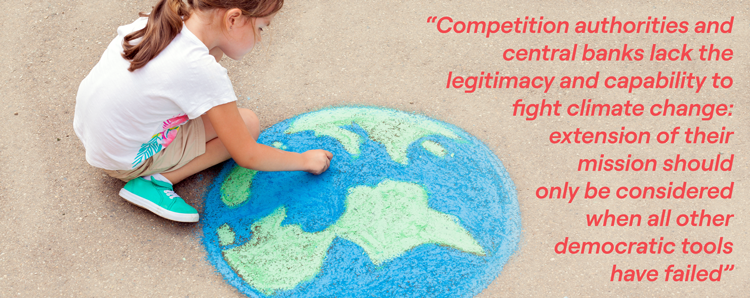Frustrated with the serial failures of our governments to get to grips with existential challenges including climate change and inequality, many proponents of change have begun to call for competition authorities, central banks and other agencies to step in. In a forthcoming article in ‘Competition Law and Policy Debate’, TSE founder Jean Tirole discusses the tradeoffs that may arise when independent institutions enter the vacuum left by ineffectual politicians.
Why are some agencies independent?
Independent agencies differ from governmental ones in two respects. First, they are not accountable electorally; this makes them more independent of the whims of the electorate, but it also makes it particularly important to select highly competent and independent officials at their head. Second, government is the quintessential multi-mission actor. In contrast, independent agencies can focus on specialized missions, delegated to them by politicians and the nation. Compared to their politically controlled predecessors, independent central banks have proved better at taming inflation and regulating banks (even though their own performance occasionally leaves much to be desired), and independent competition authorities have more consistently pursued consumer interests. But independence comes with duties. Agencies do not choose their mission and its broad outlines are clearly specified: independence requires limited and mandated powers.
 Do competition authorities have social responsibilities?
Do competition authorities have social responsibilities?
Experts have long debated the merits of a welfare standard that considers industry profits as well as consumer benefits. Profits can benefit consumers if they incentivize better goods and services, but they may also reflect wasteful spending. In contrast, a narrower focus on consumer surplus can facilitate redistribution and simplify the mission.
There is plenty of consensus on key competition concerns about, for example, contestability of bottleneck segments and fairness with regards to business users’ access to them in the shadow of Big Tech monopolies. However, broader societal goals or “out of market effects” – such as redistribution, environment, wage growth, and strategic independence – belong to the political domain. As worthy as these goals are, competition authorities are the wrong institutions for the job and cannot operate in these domains without losing independence. There is also the risk that firms exaggerate the social benefits of their mergers or cartel agreements.
When Europe’s competition authority stepped in to impose a €2.7 billion fine on German diesel automakers for colluding on non-compliance with NOx emissions regulation, this was the right outcome, but the wrong process: environmental standards should be enforced by environment ministries, not by an agency in charge of protecting consumers who actually benefited from the cartelization!
Prioritizing cases according to their social impact should not be controversial: with limited resources, we should sue milk cartels before caviar ones. But we must be wary of well-meaning measures – such as protecting fair-trade importers against competition by low-cost producers, allowing cartels in pursuit of social goals, or allowing firms to collude for rich consumers against a promise of below-cost prices for poorer households – that may ultimately do more harm than good.
Should regulators worry that competition corrupts?
There is widespread suspicion that competition promotes unethical behavior. For example, we may feel that immorality is more acceptable if competitors are just as bad, arguing that dictators would find other ways to acquire weapons, or that consumers would find other doctors to prescribe opioids. But my more recent work with Mathias (2022) suggests that incentives are more important for ethics than competition. Our results warn against dispensing with competition policy, anti-bottleneck regulation, and competition through trade, without careful thinking about the environment in which competition takes place.
Given political inertia, why not allow firms to get together to accelerate the green transition?
Ideally, governments must take the lead with carbon-pricing regulation and disruptive green innovation. Private initiative is a second-best situation, but the scale and urgency of the problem means that every solution should be on the table. Ethical agreements among competitors – such as a boycott of polluting suppliers or coordination on environmentally friendly packaging – can raise social welfare when unilateral responsible behavior runs the risk of loss of market share. For example, firms may struggle to reduce emissions if competitors do not.
However, these agreements risk including ancillary restraints and providing cover for price collusion: they should not be protected by a safe harbor and do not preclude the need for regulation of ethical dimensions. Industry-sponsored standards can erect barriers to entry and self-regulation is not a reliable way to close loopholes and enforce standards. Competition authorities may be able to allow such agreements if there is a clear objective trading off harm to the consumer or competition against the environmental benefit, as well as careful monitoring of firms’ compliance.
What about central banks? Can they save us from ecological catastrophe?

Successive economic crises since 2008 have required central banks to go beyond their traditional role of providing financial stability. Integrating climate risk into stress tests is a no-brainer and is already in central banks’ remit. But proposals to relax prudential standards for climate-friendly bank lending, or for the ECB to purchase green bonds in order to reduce their spreads, ignore the real issue: the failure of politicians to price carbon properly. Poorly regulated green loans might also trigger financial crises : raising capital requirements for brown finance would be preferable.
As with competition authorities, central banks lack both the legitimacy and the capability to fight climate change: the extension of their mission should only be considered when all other democratic tools have failed. To be both legitimate and effective, a green central bank would need a democratic mandate to enlarge its mission, budgetary oversight, and sufficient staff to define what is green, verify emissions claims, and run cost-benefit analyses.
What happens when agencies take on broader challenges?
Multiplying an agency’s missions often reduces accountability and policy coherence. Environment ministries have been joined in the fight against climate change by central banks, competition authorities, national courts, the IMF and many other multilateral, regional and local organizations. This risks confusion over who is in charge. Furthermore, it may be difficult to endow multiple agencies with the same, preferred instruments, such as a carbon price for curbing CO2 emissions or an income tax for redistributing income; some agencies may therefore use cost-ineffective tools.
Too many cooks and the lack of a precise definition of societal goals make it difficult for all actors to plan ahead. For example, companies may have to consider how myriad municipalities and regional governments will assess their ethical performance, how central banks and sovereign wealth funds will ESG-rate their bonds, and how competition authorities and various courts will account for societal objectives in their rulings.
Multiple missions weaken agencies’ impact in several other ways. If their resources are not expanded, agencies may be forced to detract resources away from their core mission. Even if tasks are compatible and the agency budget is expanded to account for its new missions, multi-factored missions generate incentive issues. My research with Mathias Dewatripont (1999) shows that expanding the set of tasks typically reduces total agency effort (“grasp all, lose all”). For effective action, agencies need a clear mission, focusing on well-defined operational goals that are easily assessed.
Why have ethical policies for firms but not for agencies?
ESG policies run into many of the same problems – from measurement issues to greenwashing – in both the private and public sectors. We lack evidence on this issue, but my hunch is that corporate and agency ESG are different, as agencies face fewer checks, lacking skin in the game for management or hard oversight by directors.
KEY TAKEAWAYS
The worthy goals envisioned by advocates of socially responsible agencies can often lead to a better outcome for society. But we should be wary about mission creep for five key reasons:
1. Implementation: Firms that push for policies involving consumer or taxpayer money may be less eager to help monitor and implement them.
2. Independence: Competition authorities and other agencies lack the legitimacy to address wider societal challenges, and incursion into the political domain risks loss of independence.
3. Wrong tools for the job: Competition authorities and other agencies may lack the capability – for measuring emissions or taxing CO², for example – to address wider societal challenges.
4. Buck-passing: Agencies’ new duties may give governments an additional excuse not to act.
5. Too many cooks: Multiple agencies in charge of a fuzzy mission may lead to a lack of accountability, turf wars and coordination failures; it may also increase the cost of doing business by forcing firms to second guess the policies of multiple authorities.
FURTHER READING
Jean’s mimeo ‘Socially Responsible Agencies’ is forthcoming in Competition Law and Policy Debate. For Jean’s research on missions and accountability, see The Economics of Career Concerns (1999). For further discussion of green central banks, see the synthesis chapter in the Blanchard-Tirole report (2021).
Article published in TSE Reflect, April 2023




